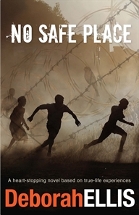No safe place by Deborah Ellis

Allen and Unwin, 2011. ISBN 978 1742374709.
(Ages 12+) Highly recommended. Refugees. The picture of Abdul standing
on
the edge of Calais watching backpackers, oblivious to anyone else,
showing their passports and getting on a ferry for England, secure in
the knowledge that they have that privilege, stayed with me for the
whole of this tense read. Other images rose up in my mind, but that one
of the huge gulf between the two worlds that exists today, that of non
refugees and refugees, remains with me.
As Abdul bravely claims a place on a boat leaving French soil the
stories of the other passengers on that tiny boat are revealed. Once
out in the channel, the boat owner turns on the refugees but they throw
him overboard. Struggling to survive they wash up against a pleasure
cruiser and in a strange turn of events take over the cruiser and head
north west, knowing they will hit either England or Ireland. When they
do they are helped by a young girl, oblivious to the political
machinations behind these four children seeking a better life for
themselves.
Their stories are harrowing, made up of a range of stories Ellis has
heard while researching this book, revealing for our very sheltered
readers what children of their age must contend with, things many of us
will never see. From the orphaned Chesley, holding on to an image
of his mother through a series of Russian boys' homes before ending up
in an army cadet school, to Rosalia, taken by her uncle's friend to
Germany where they think she will be employed as a maid, to the nephew
of the boat owner, Jonah, told that he is useless and a burden and
finally Abdul, the main character of the story, holding a myriad of
stories within him of unjustified persecution, loss and despair, this
novel will firstly engender disbelief and then sympathy from its
readers.
Ellis' fight for human rights, particularly for children scarred by
war, forms a powerful sub text to this novel, and along with the multi
award winning Parvana series, will be promoted within schools as part
of a literature study of books about our contemporary world, or as a
class text, and all students will follow Abdul's story with pleasure
and empathy.
Fran Knight